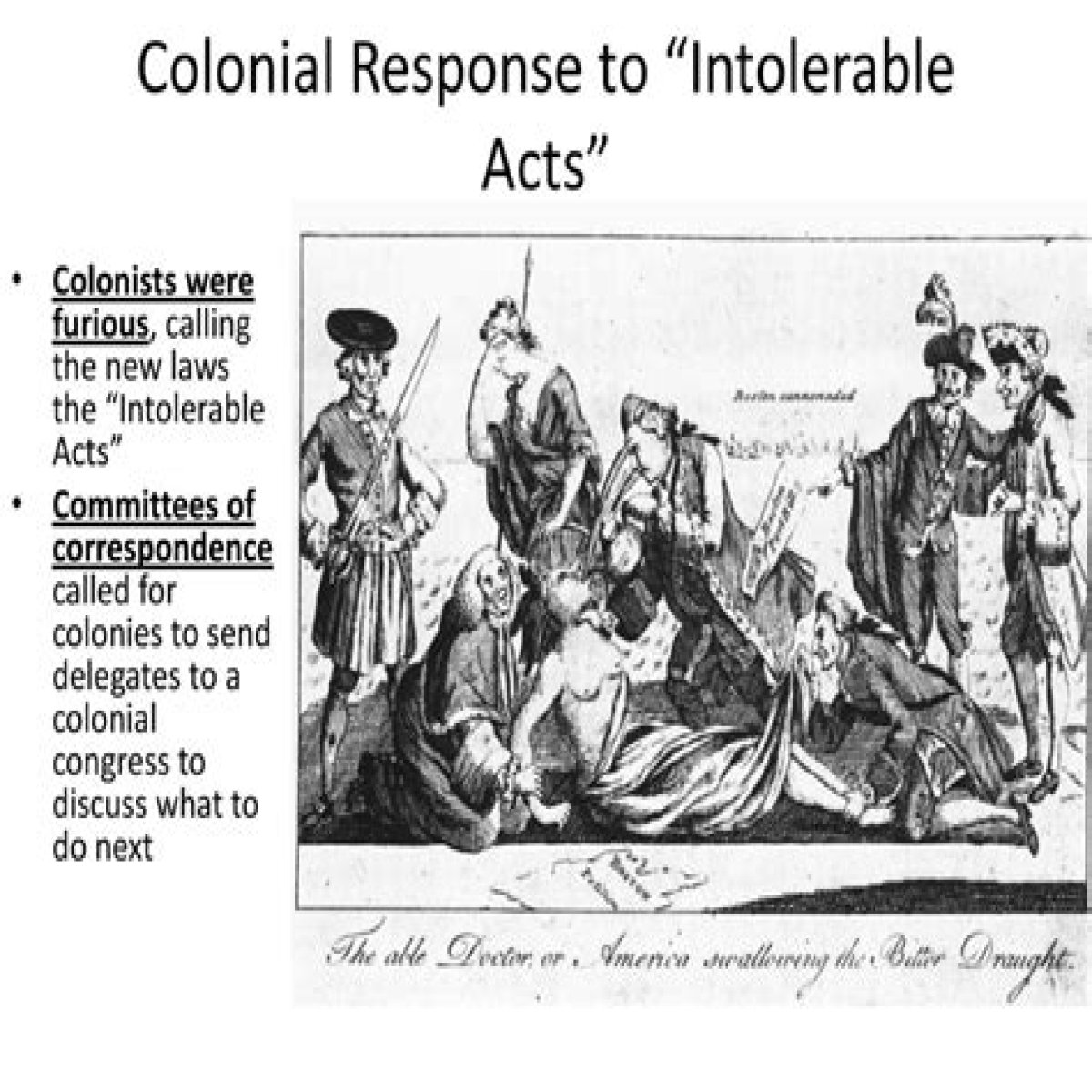How did colonists react to the intolerable acts?
The Intolerable Acts were aimed at isolating Boston, the seat of the most radical anti-British sentiment, from the other colonies. Colonists responded to the Intolerable Acts with a show of unity, convening the First Continental Congress to discuss and negotiate a unified approach to the British.
What were the 5 Laws of the Intolerable Acts?
Read the Intolerable Acts as they were written in 1774:
- Boston Port Bill. Date Passed: March 31, 1774.
- Administration of Justice Act. Date Passed: May 20, 1774.
- Massachusetts Government Act. Date Passed: May 20, 1774.
- Quartering Act. Date Passed: June 2, 1774.
- Quebec Act. Date Passed: June 22, 1774.
Why were the Intolerable Acts unfair to the colonists?
The British Government passed the Intolerable Acts as a punishment to the colonies for the Boston Tea Party. This was a specific act that was in direct response to the Boston Tea Party. The colonists thought it was unfair because it punished all citizens for the crime of a few.
What were the three acts that were intolerable to the colonists?
The four acts were the Boston Port Act, the Massachusetts Government Act, the Administration of Justice Act, and the Quartering Act. The Quebec Act of 1774 is sometimes included as one of the Coercive Acts, although it was not related to the Boston Tea Party.
What was the Quartering Act?
Quartering Act, (1765), in American colonial history, the British parliamentary provision (actually an amendment to the annual Mutiny Act) requiring colonial authorities to provide food, drink, quarters, fuel, and transportation to British forces stationed in their towns or villages.
How did the Quartering Act end?
In the end, like the Stamp and Sugar acts, the Quartering Act was repealed, in 1770, when Parliament realized that the costs of enforcing it far outweighed the benefits. In 1774, a far more draconian Quartering Act was imposed on the colonists of Massachusetts as one of the punishments for the Boston Tea Party.
What would happen if you didn’t follow the Quartering Act?
For failure to comply with the Quartering Act, Parliament suspended the Province of New York’s Governor and legislature in 1767 and 1769. In 1771, the New York Assembly allocated funds for the quartering of the British troops.
What was the effect of Quartering Act?
This new act allowed royal governors, rather than colonial legislatures, to find homes and buildings to quarter or house British soldiers. This only further enraged the colonists by having what appeared to be foreign soldiers boarded in American cities and taking away their authority to keep the soldiers distant.
What did the Redcoats do to the colonists?
During the redcoats’ entire march back to Boston, minutemen harrassed them, firing from behind fences, houses, trees, and rocks. By the end of the day, the redcoats suffered three times more casualties than had the colonists.
What was the consequence of the Boston Tea Party?
As a result of the Boston Tea Party, the British shut down Boston Harbor until all of the 340 chests of British East India Company tea were paid for. This was implemented under the 1774 Intolerable Acts and known as the Boston Port Act.
How did the colonist react to the Boston Tea Party?
American colonists responded with protests and coordinated resistance by convening the First Continental Congress in September and October of 1774 to petition Britain to repeal the Intolerable Acts.
Why did colonists react so strongly against the Tea Act?
Why did colonists react so strongly against the Tea Act, which imposed a smaller tax and actually lowered the price of tea? The colonists believed that the British ministry was bribing the Americans with the cheaper East India Company’s tea so they would give up their principled opposition to the tea tax.
Why did the stamp act anger the colonists more than the Sugar Act?
The Stamp Act, passed in 1765, was a direct tax imposed by the British Parliament on the colonies of British America. Because of its potential widespread application to the colonial economy, the Stamp Act was judged by the colonists to be a more dangerous assault on their rights than the Sugar Act.
